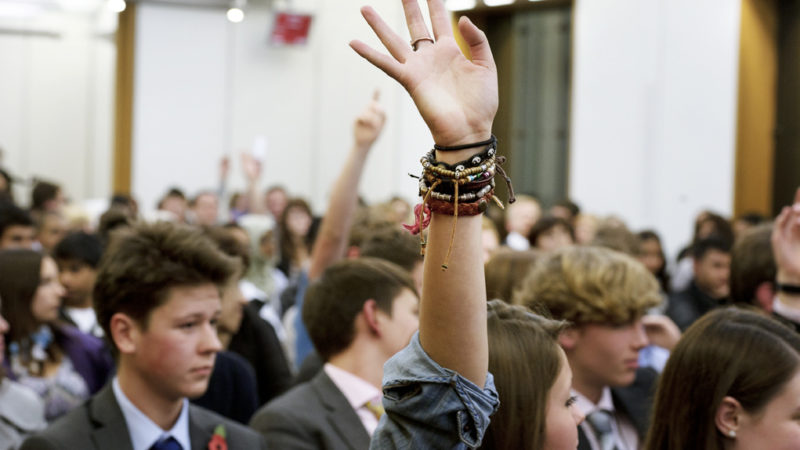Political activity among teenagers is on the rise, but by the time they get to vote many feel they are no being heard at all. It's time we lowered the voting age, Jim McMahon MP writes.

We cannot expect any group to be politically engaged if they look at the system and it doesn’t represent them. Nor should we, if politicians don’t talk to them about the issues that matter most.
We want policy and politics done by people, not to people – and this means young people too.
A fundamental problem that cuts through the debate is that we make platitudes about ‘listening to young people’ and ‘giving young people a voice’ – but stop way short of giving them a stake in the decisions that affect their lives.
A starting point would be getting more young people actively involved in politics and civic society, just as with other under-represented groups.
Coupled with compulsory political education in schools, I believe this is the panacea to voter apathy. We must engage the next generation of teenagers, but we must also foster the habit of voting from an early age. We can’t be critical of low voter turnout and political apathy, and not change the system as it stands.
Some of the building blocks for involving young people in our democracy are in place. Locally we have a network of youth councils – like my own, the Oldham Youth Council. Our Members of the Youth Parliament debate in the House of Commons chamber from the age of 16 and MPs could learn from their well-researched and passionately delivered speeches. This goes to show that if the right structures and opportunities are put in place, then young people will become engaged in our democracy and civic institutions.
Some policy makers have gone further and given young people a direct hand in the design and delivery of the local services they use. For example, Nottingham Council’s Next Generation is a ‘design thinking’ approach to co-design services that improves the lives of young people facing multiple disadvantages in Nottingham. The Council works in partnership with young people and local organisations to identify priorities, design innovative response to these challenges, and then present service recommendations for commissioners to take forward.
But we have stopped short of giving these same young people a vote in national elections.
A fundamental starting point is to enfranchise 16 and 17 year-olds by lowering the voting age. Young people are under-represented at every level of British politics. The starting point should be to create the structures which make it possible and most importantly, meaningful. And by meaningful, I mean politicians moving beyond talk of giving young people a voice, to actually equipping them with the power to affect change locally and nationally.
In parliament, only 2 per cent of MPs are under 30, despite 16 per cent of the UK’s population being aged 18 to 29.
In the period from 1979 to 2017, the average age of MPs at elections has been consistently around 50-years-old.
So why would votes at 16 better the lives of people growing up in the 2020s and beyond?
Historically, political parties in the UK have not engaged with youth issues.
Demographically we are witnessing a ‘youth bulge’ – there are more young people aged 15 to 29 living in the UK today than at any point in our history. But in the UK, like everywhere else in the world, we have an ageing population. From a policy perspective, this means we have an important opportunity to invest in young people in order to secure our country economically, democratically and societally.
Young people are more educated, vocal and politically literate than ever before.
This has happened organically, through easier access to online news, articles and platforms for expressing views, though often on platforms like Snapchat that are not frequented by politicians. And it has happened through structural changes too. For example, in 2002 the New Labour government mandated schools to teach compulsory citizenship classes – including a small dose of political education. Studies have evidenced its success in boosting civil and civic engagement, but there is a long way to go.
Finally, there is a growing sense of awareness of the implications of decisions on the wellbeing of young people. It is an obvious point, but it has been brought into sharp focus by the Brexit vote, as well as the independence referendum in Scotland. A study by the Prince’s Trust showed that over half of young people are fearful for the future following recent political events. This feeling is compounded by issues such as housing, the rising cost of education and uncertain employment prospects.
From my experience, if you put young people’s issues on the table, young people will engage with politics. But that engagement will drop off if they don’t have the vote.
We simply can’t ignore the evidence of apathy and anxiety as a new generation grows up with a sense of being locked out of decisions made on their behalf. They are growing up believing politics is something done to them, not for them, and with no one seemingly fighting their corner.
We must reframe the argument, away from young people having to prove their worth, towards seeing that broader democratic participation benefits us all.
This essay is taken from Growing Up in the 2020s, a new Fabian Society report in partnership with NASUWT.
Jim McMahon is the Labour MP for Oldham West and Royton.
Left Foot Forward doesn't have the backing of big business or billionaires. We rely on the kind and generous support of ordinary people like you.
You can support hard-hitting journalism that holds the right to account, provides a forum for debate among progressives, and covers the stories the rest of the media ignore. Donate today.



